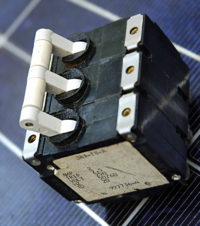Difference between revisions of "Three-phase power"
(Make into separate article) |
m (+ breaker image) |
||
| Line 1: | Line 1: | ||
| + | [[Image:3-phase_power-breaker.png|thumb|200px|right|A 3-phase power [[circuit breaker]]]] | ||
| + | |||
'''Three-phase power''' is the form of [[alternating current|AC]] power often supplied in for use in powering heavy equipment (especially rotating equipment); i.e. there are a trio of supply [[conductor]]s, each of which carries power in a different [[phase]]. (The three phases differ by 120 degrees; degrees being a measure used for sinusoidal waveforms, with 360 degrees being one complete cycle.) | '''Three-phase power''' is the form of [[alternating current|AC]] power often supplied in for use in powering heavy equipment (especially rotating equipment); i.e. there are a trio of supply [[conductor]]s, each of which carries power in a different [[phase]]. (The three phases differ by 120 degrees; degrees being a measure used for sinusoidal waveforms, with 360 degrees being one complete cycle.) | ||
Latest revision as of 12:19, 28 August 2024

Three-phase power is the form of AC power often supplied in for use in powering heavy equipment (especially rotating equipment); i.e. there are a trio of supply conductors, each of which carries power in a different phase. (The three phases differ by 120 degrees; degrees being a measure used for sinusoidal waveforms, with 360 degrees being one complete cycle.)
This allows the torque produced in an electric motor to be 'smoother' - in a motor powered by single-phase AC, the torque output will necessarily be sinusoidal, like the input voltage.
The 3 phases have to be connected to the motor in the correct 'order', or the motor may rotate in the other (i.e. 'wrong') direction. There are stories of large (older) disks, powered by 3-phase power, being connected the wrong way around - with the un-wanted result!